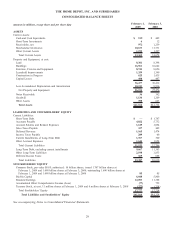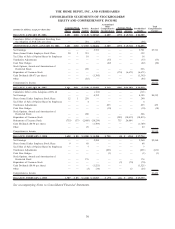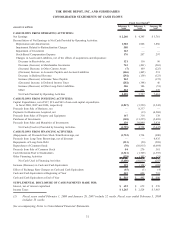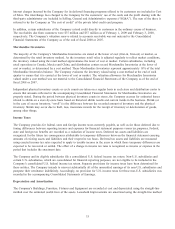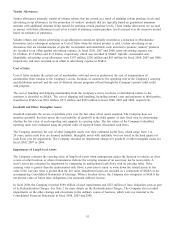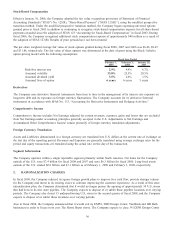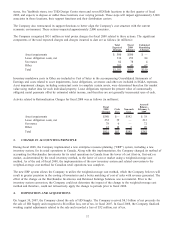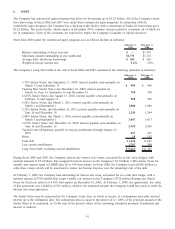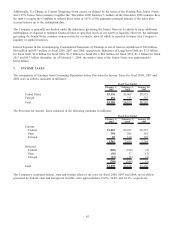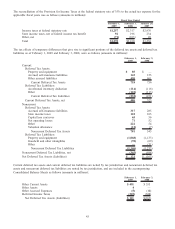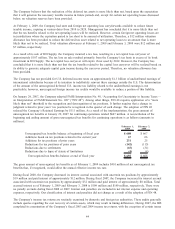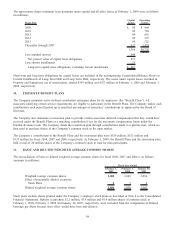Home Depot 2008 Annual Report Download - page 44
Download and view the complete annual report
Please find page 44 of the 2008 Home Depot annual report below. You can navigate through the pages in the report by either clicking on the pages listed below, or by using the keyword search tool below to find specific information within the annual report.administrative errors retroactively and without separate approvals. The administrative errors included
inadvertent omissions of grantees from lists that were approved previously and miscalculations of the number
of options granted to particular employees on approved lists.
• All options granted from December 1, 2000 through the end of 2001 had an exercise price based on the
market price of the Company’s stock on the date of a meeting of the Board of Directors or some other date
selected without the benefit of hindsight. The February 2001 annual grant was not finally allocated to
recipients until several weeks after the grant was approved. During this period, the stock administration
department also corrected administrative errors retroactively and without separate approvals as in the period
2002 to the present.
• For annual option grants and certain quarterly option grants from 1981 through November 2000, the stated
grant date was routinely earlier than the actual date on which the grants were approved by a committee of the
Board of Directors. In almost every instance, the stock price on the apparent approval date was higher than the
price on the stated grant date. The backdating occurred for grants at all levels of the Company. Management
personnel, who have since left the Company, generally followed a practice of reviewing closing prices for a
prior period and selecting a date with a low stock price to increase the value of the options to employees on
lists of grantees subsequently approved by a committee of the Board of Directors.
• The annual option grants in 1994 through 2000, as well as many quarterly grants during this period, were not
finally allocated among the recipients until several weeks after the stated grant date. Because of the absence of
records prior to 1994, it is unclear whether allocations also postdated the selected grant dates from 1981
through 1993. Moreover, for many of these annual and quarterly grants from 1981 through December 2000,
there is insufficient documentation to determine with certainty when the grants were actually authorized by a
committee of the Board of Directors. Finally, the Company’s stock administration department also
retroactively added employees to lists of approved grantees, or changed the number of options granted to
specific employees, without authorization of the Board of Directors or a board committee, to correct
administrative errors.
• Numerous option grants to rank-and-file employees were made pursuant to delegations of authority that may
not have been effective under Delaware law.
• In numerous instances, and primarily prior to 2003, beneficiaries of grants who were required to report them
to the SEC failed to do so in a timely manner or at all.
• The subcommittee concluded that there was no intentional wrongdoing by any current member of the
Company’s management team or its Board of Directors.
The Company believes that because of these errors, it had unrecorded expense over the affected period (1981 through
2005) of $227 million in the aggregate, including related tax items. In accordance with the provisions of SAB 108, the
Company decreased beginning Retained Earnings for fiscal 2006 by $227 million within the accompanying Consolidated
Financial Statements.
As previously disclosed, the staff of the SEC began in June 2006 an informal inquiry into the Company’s stock option
practices, and the Office of the U.S. Attorney for the Southern District of New York also requested information on the
subject. On December 10, 2008, the SEC stated in a letter to the Company that it did not intend to take any action as a
result of the inquiry. The SEC matter is therefore now closed, and the Company has not received any communication
from the Office of the U.S. Attorney since 2006.
39


